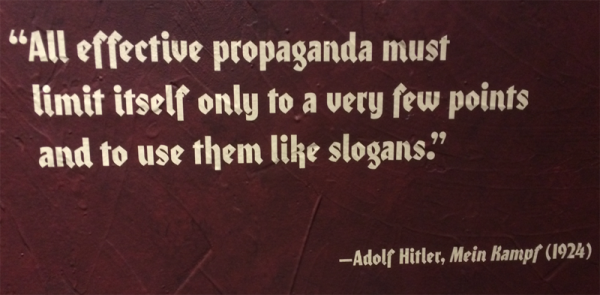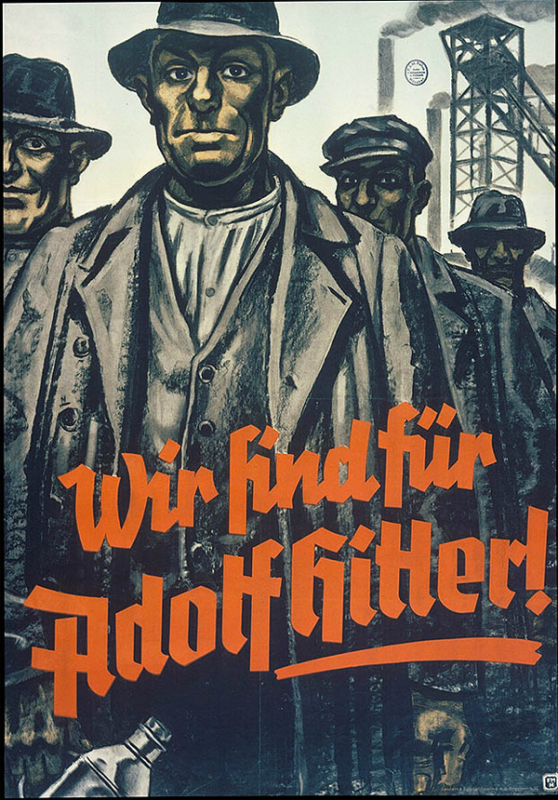Eight lessons from Nazi Propaganda
On my way through Austin, Texas last week I had a free afternoon and on a whim went to the Bullock museum of Texas History. To my surprise there was an entire exhibition about Nazi Propaganda, called State of Deception. It seemed timely somehow, so I bought a ticket and stepped inside.
Here is what I learned, in eight points.

- Germany, as a democracy, was a world leader in the 1920s in media and mass communication technology. It had more newspapers (4700) than most nations in the world. It pioneered improvements to radio and television, the high-tech of the era. Its internationally acclaimed film industry ranked among the world’s largest. It was a technological and communication leader on the planet.
- After the great depression (1929), German citizens were divided between left and right. Millions found the simple messages of Nazi propaganda appealing in times of economic hardship and instability. They left mainstream parties to support Adolf Hitler.
 The Nazis’ platform did not initially scare many voters. While many voters weren’t necessarily at first attracted primarily to racist themes, they were willing to overlook them in hopes of economic promises. The Nazi’s carefully crafted different messages to different audiences, using nuance to signal to their deepest supporters without offending more moderate voters. This poster at right (“We’re for Adolf Hitler”) was aimed at unemployed coal miners, suggesting a vote for Hitler would bring their jobs back. At the same time explicitly racist posters were also being widely distributed.
The Nazis’ platform did not initially scare many voters. While many voters weren’t necessarily at first attracted primarily to racist themes, they were willing to overlook them in hopes of economic promises. The Nazi’s carefully crafted different messages to different audiences, using nuance to signal to their deepest supporters without offending more moderate voters. This poster at right (“We’re for Adolf Hitler”) was aimed at unemployed coal miners, suggesting a vote for Hitler would bring their jobs back. At the same time explicitly racist posters were also being widely distributed.- The term propaganda was originally a neutral term for the dissemination of information in favor of a cause. In the 1900s the term took on a negative meaning “representing the intentional dissemination of often false, but certainly compelling claims to support or justify political actions or ideologies” (wikipedia).
- Propaganda, by definition: plays on emotions over facts and mixes truths, half-truths and lies. Hitler, and his propaganda minister Goebbels, had a deep understanding of mass media. They masterfully offered an appealing message of national unity and a utopian future, while simultaneously targeting the brutal persecution of minorities and anyone who disagreed with, or competed against, their ambitions for power. Outsiders and minorities were an easy target to blame for national problems, or the failure to fix them.
- In 1933 a fire at the parliament, assumed to be a terrorist act, was used as an excuse to suspend the German Constitution. The fire was claimed to be the beginning of a communist revolution, allowing Hitler, who was only chairman at the time, to convince the president to use article 48 to suspend many elements of democratic process, giving the president near dictatorial powers. These powers were never revoked.
- Within months the Nazi regime destroyed the country’s free press. There were no longer alternatives to propaganda, making it harder to recognize. The regime closed opposition newspapers, forced Jewish-owned publishing companies to sell to non-Jews, and secretly took over established periodicals. By controlling the media there was no possibility of dissension. Questions could not be asked. Answers could not be heard. Citizens were not offered alternative views to consider nor the means to voice them. Power became unchecked. Challengers were increasingly easy to threaten, as news of their challenge, or imprisonment, would never be known.
- In less than six months, Germany’s democracy was destroyed. The government became a single party dictatorship. Rights such as freedoms of expression, press, and assembly were revoked. Police established concentration camps to imprison those deemed to be “enemies of the state” which included intellectuals, teachers, writers and artists, among those chosen simply because of their race or ethnicity.
An online version of the exhibit can be found here including a powerful archive of posters, signs and cartoons from the era as well as recommendations for supporting independent media in the US.
Related:
- 2016 Post Election Sanity Guide (includes a detailed comparison of this story to what might happen in the U.S.)

What will our Reichstag Fire be? And is the mainstream media ready for it, or will they bend over backwards to be fair and balanced?
This article suggests that the U.S. Constitution has no equivalent to article 48 and limits executive power when compared to it.
https://benjaminstudebaker.com/2016/11/11/how-the-left-can-survive-under-trump/
But as you suggest, the burden will be on the Senate and the press to frame the appropriate response to a major act of terrorism.
Less than 6 months? It will be interesting to see how it plays out this time.
An interesting history lesson. To bad this isn’t common knowledge but as we forget history we are doomed to repeat it. That being said, I do not think we have repeated history, unlike what is insinuated.
“Human” your comment is interesting to me given your post (https://psychopathresistance.wordpress.com/2016/11/20/lack-of-empathy/). First, by your very definition the party you appear to support (Hillary, et al) fits the description perfectly. I know you do not read it that way, funny how we lose objectivity when we want something…sort of like the Germans…
To be clear, I support our system of government. I am equally critical of both parties. From my observations and research we only have one party in this country, not two, the evidence is there if you look for it. That aside the DNC platform is the most similar to the Nazi’s. I won’t go down the list, because I have learned that is pointless (I have left you an opening to mock me for my inability to prove anything). Honestly I don’t have the time nor interest in changing your mind as it is already decided. I am just saying if you have any objectivity left you may want to reevaluate your world view. Not a world view biased by your emotions and opinions.
And Scott, if I am right about your intent here, at least have the guts to say it out loud. Stop hiding in the shadows, there are plenty of people that will agree with you (either way) and stand with you. But at least those who disagree can know where you stand. Conservatives support the rights of those who disagree with them, it is liberals who wish to silence those who do not agree…hmm, that sounds familiar…
Thanks for the history lesson (sans political snarkiness), it is something we should all be more aware of because we are inundated by it from all sides these days.
> I am equally critical of both parties.
I almost took you at your word.
> Conservatives support the rights of those who disagree with
> them, it is liberals who wish to silence those who do not agree
Justify as you see fit…
I was not referring to a political party here. But how people self identify. As evidence I do not recall and riots or protests after Obama won the election. I also know that most conservatives didn’t like Bush either.
Scott I’ve had the same realization about Trump and the Nazis, with Bannon in the role of Goebbels. Nazis exploited the relatively new communication powers of radio, just like Trump with social media and fake news. Germany had endured a brutal and humiliating depression… orders of magnitude greater in comparison to America’s white working class’s struggles since the 1970s (and exacerbated since 2008) but similar in effect. The same pattern: blaming minorities and outsiders, making wild promises, and declaring falsehoods as truth, is appearing.
Mainstream media dismissed Hitler as a quack, just as they did Trump.
What starts as mild – deporting criminal illegal aliens – can be extended to more extreme measures when the first inevitably fail to achieve results. “Now it’s not just the criminals that need to be removed, it’s all of them.” The discrediting of the hispanic-named judge is a chilling preview of heredity checks for racial purity, with the goal of relegating the mud-bloods to a formal “working class” status with inferior rights and benefits.
Wait, this has already been proposed…it’s the “Guest Worker” status.
And without a healthy and informed middle class in place to block such efforts, the 1% has the path forward (by privatizing and manipulating social security for example) to make some more equal than others.
Scary.
It seems to me that if people did the citizenship thing, along with voting, before the election, then they can continue to take citizenship-type action, along with voting, after an election.
I remember two German university students explaining to me that back in those days Germans did not have a deep understanding of democracy. Like a third world country where book-learning about democracy is not matched by experience.
Today I think Germans know that if they come for you in the morning, they will come for me in the afternoon.
I realize it’s possible in America to have too much fear and learned helplessness. After all, when Homeland Security acted unbelievably ignorantly, adults weakly proposed a no-fly day. I thought of kids doing a helpless protest in boarding school.
A more practical solution would be to give congress some oversight or control over Homeland so that unbelievable mistakes can be nipped in the bud. Perhaps this has been done: As a non-U.S. citizen, my knowledge is no more recent than the events in the movie Snowden.
An interesting exhibition for sure, and it’s well we don’t forget the lesson. There are differences between interwar Germany and present day America, though.
First, as someone has mentioned, German democracy had shallow roots. Defeat in WWI took the German public by surprise, as Ludendorff had kept the truth from the German public right up until the armistice was signed.
The Weimar Republic was a new democratic state in a country that had only ever known a diluted form of democratic government under the Kaiser. It was immediately beset on the left by those looking to spread the Russian Revolution and communism and on the Right by those who believed the civil government had stabbed the German army in the back. To make matters worse, the punitive terms of the Versailles treaty created conditions in which no government of any stripe could succeed.
So there are certainly parallels, and American democracy is surely under threat, but it also has deeper, stronger roots.
I just thought I would inform Berkun fans that Scott’s October post about the design conference has been greatly expanded, since the first few days, and is fun reading.